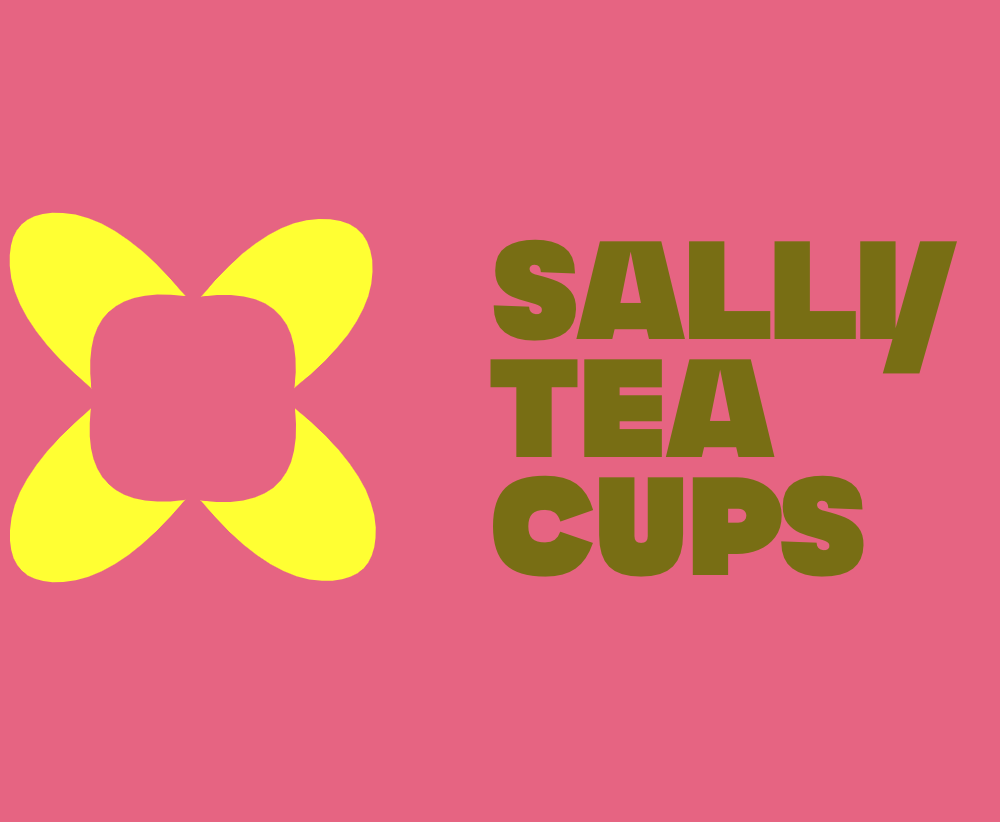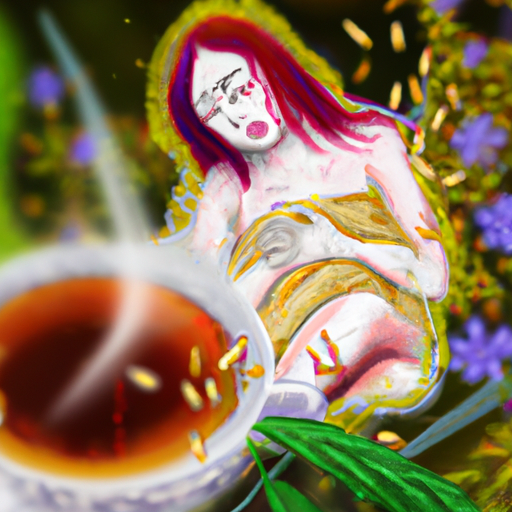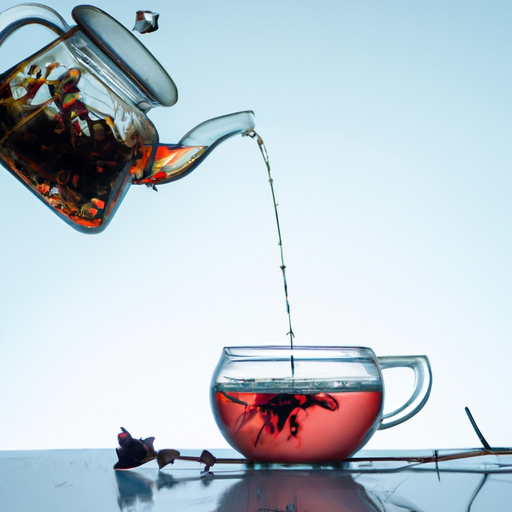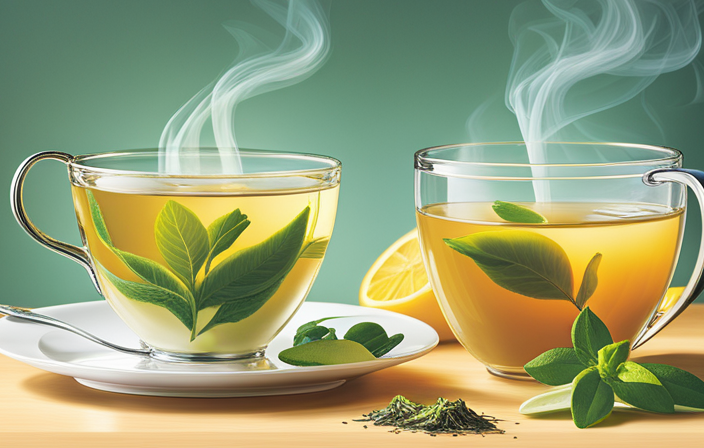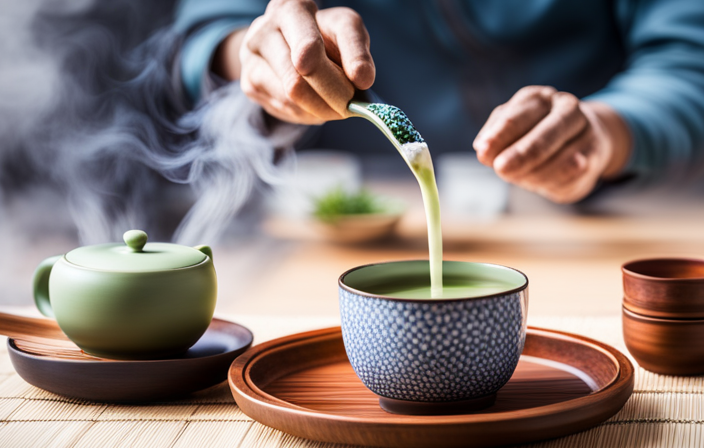African Tea
What Tea Is Good For Dehydration

One popular saying is, ‘you are what you drink.’
And when it comes to hydration, choosing the right beverage can make all the difference. Dehydration can occur when your body doesn’t have enough water to function properly, and it can lead to a host of unpleasant symptoms like fatigue, headaches, and dry mouth.
Luckily, there are many types of tea that can help keep you hydrated and feeling your best. Tea has been enjoyed for centuries as a way to promote health and wellness, and it’s no surprise that it can also be a great way to stay hydrated.
In fact, many types of tea contain compounds that can help your body retain water and stay balanced. But with so many options to choose from, it can be hard to know which teas are best for hydration.
In this article, we’ll take a closer look at the causes and symptoms of dehydration, the science behind tea and hydration, and some of the best teas to drink when you need to stay hydrated.
Key Takeaways
- Tea can help with hydration and balance, providing similar benefits as water.
- Herbal teas like chamomile, ginger, and peppermint can provide hydration without the diuretic effects of caffeine.
- Certain herbal teas contain electrolytes and minerals that can aid in hydration, such as hibiscus tea with its antioxidants and blood pressure-lowering properties.
- Proper brewing techniques are important, including using fresh, cold water and steeping green and white teas for 1-3 minutes and herbal teas for 5-10 minutes.
Causes and Symptoms of Dehydration
Feeling parched and exhausted? That’s because your body is lacking fluids, leading to the symptoms of dehydration. Dehydration occurs when your body loses more fluids than you take in, resulting in a lack of water and electrolytes. This can happen due to various reasons, including excessive sweating, diarrhea, vomiting, and not drinking enough water.
Prevention methods for dehydration include drinking enough water, especially when exercising or in hot weather, and eating foods rich in water and electrolytes, such as fruits and vegetables. Treatment options for mild dehydration include drinking water or sports drinks with electrolytes, while severe dehydration may require intravenous fluids.
Remember to listen to your body’s thirst signals and drink water regularly to avoid dehydration. With that said, let’s dive into the science behind tea and hydration.
The Science Behind Tea and Hydration
Now that you understand the causes and symptoms of dehydration, let’s dive into the science behind tea and hydration.
Did you know that caffeine can actually affect your hydration levels?
We’ll explore the benefits of herbal teas and how they can help with hydration, as well as the electrolytes and minerals found in certain types of tea.
Get ready to learn how tea can be a powerful tool in maintaining optimal hydration levels.
How Caffeine Affects Hydration
Interestingly, consuming caffeine can actually worsen dehydration due to its diuretic effects. Caffeine metabolism stimulates the kidneys to produce more urine, leading to fluid loss. This can be especially detrimental for athletes or individuals who engage in physical activities that cause sweating, as it can further dehydrate the body and impair performance.
To ensure proper hydration, it’s important to limit or avoid caffeine-containing beverages such as coffee, tea, and soda. Instead, opt for water or herbal teas that can provide hydration without the diuretic effects of caffeine. Some great options include:
- Chamomile tea: This herbal tea has anti-inflammatory properties and can help soothe the stomach.
- Ginger tea: Ginger has been shown to have anti-nausea properties and can also help reduce inflammation.
- Peppermint tea: This refreshing tea can help settle the stomach and aid in digestion.
By choosing herbal teas over caffeine-containing beverages, you can stay hydrated and reap the additional health benefits that come with drinking these natural remedies.
Benefits of Herbal Teas
Sipping on herbal teas offers a range of health benefits, including anti-inflammatory and anti-nausea properties, making them a great alternative to caffeine-containing beverages.
Herbal tea types such as ginger, chamomile, and peppermint contain antioxidants and flavonoids that can help improve digestion and boost the immune system. These teas also have hydration benefits, as they’re free of caffeine and have a low sugar content, making them a great option for those looking to stay hydrated without consuming excess calories.
In addition to these benefits, some herbal teas also contain electrolytes and minerals that can aid in hydration. For example, nettle tea contains potassium, magnesium, and calcium, all of which are essential for maintaining proper fluid balance in the body.
As you continue to explore the world of herbal teas, keep in mind the many different types and their unique benefits, and don’t forget to stay hydrated by incorporating these delicious and nutritious beverages into your daily routine.
Electrolytes and Minerals in Tea
Including electrolytes and minerals, herbal teas offer a range of health benefits beyond just hydration. When it comes to electrolytes, certain herbal teas can provide a boost to help replenish what’s lost during exercise or other activities that cause sweating.
In addition, minerals such as calcium, magnesium, and potassium can also be found in various herbal teas, all of which play important roles in maintaining healthy bodily functions.
Here are 4 examples of how herbal teas containing electrolytes and minerals can benefit your health:
-
Tea and exercise: Drinking herbal teas rich in electrolytes can help improve muscle function and prevent cramping during exercise.
-
Tea and digestion: Certain herbal teas containing minerals such as magnesium and calcium can help promote healthy digestion and relieve constipation.
-
Tea and heart health: Potassium-rich herbal teas like hibiscus can help regulate blood pressure and improve overall heart health.
-
Tea and sleep: Herbal teas containing magnesium, such as chamomile, can help relax muscles and promote better sleep.
Speaking of chamomile tea, it’s a popular herbal tea known for its calming properties. So, if you’re looking for a natural way to wind down and improve sleep quality, keep reading to learn more about the benefits of chamomile tea.
Chamomile Tea
You may not think of chamomile tea as a thirst-quencher, but it can actually be a great option for rehydration. Chamomile tea is made from the dried flowers of the chamomile plant, which comes in two varieties: German and Roman. To make a cup of chamomile tea, simply steep 2 to 3 teaspoons of dried chamomile flowers in boiling water for 5 to 10 minutes. Chamomile tea is known for its calming effects and is often consumed before bed to promote sleep.
Chamomile tea is also packed with health benefits, including its ability to soothe digestive issues, reduce inflammation, and boost the immune system. Additionally, chamomile tea has been found to have anti-anxiety properties and can help reduce symptoms of depression. So, the next time you feel dehydrated, consider reaching for a cup of chamomile tea to not only quench your thirst but also reap its many health benefits. Up next, let’s take a look at another tea that can help with dehydration: peppermint tea.
Peppermint Tea
If you’re looking for a refreshing and invigorating tea to quench your thirst, peppermint tea is a great option. Not only does it taste great, but it also boasts a range of health benefits, including aiding digestion and reducing stress.
To brew peppermint tea, simply steep a tea bag or loose leaf tea in boiling water for 3-5 minutes, then add a dash of honey or lemon to taste. Sip slowly and enjoy the cooling and soothing sensation of this delicious tea.
Health Benefits
One of the most remarkable health benefits of tea is its ability to replenish fluids and combat dehydration. Not only does tea have a high water content, but it also contains certain compounds that enhance hydration properties. Tea is a great alternative to water for those who find plain water unappealing or difficult to drink in large quantities.
In fact, tea has been shown to provide similar hydration benefits as water. While water is the ultimate hydrator, the nutritional value of tea can provide additional health benefits. For example, green tea contains antioxidants that can reduce inflammation and improve heart health. Additionally, herbal teas such as ginger and chamomile can aid in digestion and promote relaxation. Check out the table below for a comparison between tea and water:
| Tea | Water | |
|---|---|---|
| Calories | 0 | 0 |
| Caffeine | Varies | None |
| Antioxidants | Yes | No |
| Flavor options | Yes | No |
| Additional health benefits | Yes | No |
Now that you know about the nutritional value and hydration properties of tea, it’s time to learn how to brew and drink it properly.
How to Brew and Drink
To fully enjoy the flavor and benefits of your favorite tea, it’s important to know the proper brewing techniques and serving suggestions. The first step is to choose the right tea variety. White, green, and herbal teas are great options for hydration.
Once you’ve chosen your tea, follow these brewing techniques:
- Use fresh, cold water and bring it to a boil.
- For green and white teas, let the water cool for a minute or two before pouring over the leaves.
- For herbal teas, pour the boiling water directly over the leaves.
- Steep for the recommended time, usually 3-5 minutes.
- Oversteeping can result in a bitter taste and decrease the tea’s health benefits.
Serve hot or chilled with a slice of lemon or honey for added flavor.
By following these simple brewing techniques, you can fully enjoy the flavor and benefits of your chosen tea.
Now, let’s move on to the next section about ginger tea, which is known for its benefits in aiding digestion and reducing inflammation.
Ginger Tea
Ginger tea is like a warm hug on a cold day, and it can be a great way to rehydrate after exercise or illness. Not only does it provide a comforting feeling, but it also has numerous health benefits. Ginger tea can help alleviate nausea, reduce inflammation, and boost the immune system. Studies have also shown that ginger can help relieve muscle pain and soreness after exercise.
To make ginger tea, you will need fresh ginger root, water, and honey (optional). Start by peeling and slicing the ginger into thin pieces. Then, bring water to a boil in a saucepan and add the ginger slices. Let it simmer for 10-15 minutes and strain the tea into a cup. You can add honey to sweeten it, but it’s not necessary. Sipping on ginger tea throughout the day can help you stay hydrated while providing health benefits.
Moving on to the next subtopic, hibiscus tea is another excellent option for hydration.
Hibiscus Tea
If you’re looking for a refreshing and flavorful way to stay hydrated, hibiscus tea is a great option. Not only does it taste great, but it also offers numerous health benefits.
Hibiscus tea is made from the dried flowers of the hibiscus plant, which are rich in antioxidants. These antioxidants help to protect your body from damage caused by free radicals, which can lead to chronic diseases such as cancer and heart disease.
In addition to its antioxidant properties, hibiscus tea has been shown to have a positive impact on blood pressure. Studies have found that drinking hibiscus tea can lower both systolic and diastolic blood pressure in people with hypertension.
It’s also a great source of vitamin C, which can boost your immune system and help your body to absorb iron. With its deliciously tart flavor profile and numerous health benefits, hibiscus tea is a fantastic choice for staying hydrated and healthy.
Speaking of flavor, the next tea we’ll be discussing is lemon balm tea.
Lemon Balm Tea
Lemon balm tea, with its bright citrusy aroma, can transport you to a sunny afternoon in a lemon orchard. This tea, made from the leaves of the lemon balm plant, has been used for centuries for its medicinal properties.
Lemon balm tea is known to have a calming effect on the body and mind, making it a popular choice for those looking for anxiety and stress relief. If you’re looking to make lemon balm tea, it’s easy to do so. Simply steep 1-2 teaspoons of dried lemon balm leaves in boiling water for 5-10 minutes.
You can also add honey or lemon to the tea for additional flavor. Some other uses of lemon balm tea include improving digestion and reducing inflammation. Give this delicious tea a try and see how it can benefit your overall health and wellbeing.
Now that you know about the uses and recipes of lemon balm tea, it’s important to note that drinking tea can be a great way to stay hydrated. However, not all teas are created equal when it comes to hydration. Let’s explore how to drink tea for maximum hydration in the next section.
How to Drink Tea for Maximum Hydration
To stay hydrated, you want to make sure you are drinking enough of the right kinds of beverages, and one way to do that is by properly preparing and enjoying your favorite herbal infusions. While water is always the best choice for hydration, tea can also play an important role in keeping you hydrated. Here are some tips on how to drink tea for maximum hydration:
First, consider ways to flavor your tea without adding sugar or other unhealthy ingredients. Adding a slice of lemon or lime, a few sprigs of fresh mint, or a slice of fresh ginger can add flavor to your tea without adding any extra calories or sugar. Additionally, look for teas that are naturally sweet, such as licorice root or stevia leaf. When choosing a tea, opt for herbal teas that don’t contain caffeine, as caffeine can cause dehydration.
| Best Tea Brewing Methods |
|---|
| Use fresh, cold water |
| Boil water and let it cool for a minute before pouring over tea |
| Steep for 3-5 minutes |
| Do not oversteep or leave in hot water for extended periods |
| Brew tea in a covered container to retain heat and flavor |
By following these tips, you can enjoy tea as a hydrating beverage that provides health benefits without the added sugars and calories found in many other drinks. However, it’s important to remember that tea should not be your only source of hydration, and you should also drink plenty of water throughout the day. In the next section, we will explore other hydrating beverages that can help keep you healthy and hydrated.
Other Hydrating Beverages
You might be surprised to learn that there are plenty of refreshing and delicious drinks out there that can help keep you hydrated throughout the day. While tea is a great option, there are other beverages that can provide even more benefits. Here are four hydrating drinks that you should consider adding to your daily routine:
-
Coconut water: This natural electrolyte-rich drink contains potassium, sodium, and magnesium, making it an excellent choice for post-workout hydration. It also provides a great alternative to sugary sports drinks that can be harmful to your health.
-
Watermelon juice: This refreshing drink is not only delicious, but it’s also a great source of hydration. Watermelon is 92% water, making it a perfect way to rehydrate after a long day in the sun.
-
Cucumber water: Adding cucumber slices to your water not only adds flavor, but it also provides a hydrating boost. Cucumbers are 95% water and are rich in electrolytes, making them a great option for staying hydrated.
-
Herbal tea: While regular tea is a great option for hydration, herbal teas like peppermint or chamomile can also provide benefits. Not only are they hydrating, but they can also have calming effects on the body.
While sports drinks may seem like a good option for hydration, they often contain high amounts of sugar and artificial flavors that can be harmful to your health. Instead, opt for natural hydrating drinks like coconut water or watermelon juice to keep your body hydrated and healthy.
Frequently Asked Questions
Can drinking tea alone completely reverse dehydration?
Did you know that tea can hydrate you just as well as water? While drinking tea alone may not completely reverse dehydration, it can certainly help maintain hydration levels. Plus, certain teas like green tea contain antioxidants that can benefit your overall health.
Are there any negative side effects of drinking too much tea for hydration?
Drinking too much tea for hydration can lead to negative side effects such as increased heart rate, headaches, and insomnia due to caffeine. Long term effects are unclear, but recommended intake is 3-4 cups per day.
What types of tea should be avoided for hydration purposes?
To stay hydrated, avoid caffeinated tea as it acts as a diuretic. Herbal teas like chamomile, mint, and ginger are great for hydration and offer unique flavor profiles.
Is it necessary to add sweeteners or milk to tea for maximum hydration benefits?
Did you know that adding sweeteners or milk to tea can negate its hydration benefits? For optimal hydration, stick to the best types of tea like green or herbal, and enjoy them plain.
Can drinking tea be just as effective for hydration as drinking water?
Drinking tea can be just as effective as drinking water for hydration. Tea contains water, which is essential for hydration, and also offers additional benefits such as antioxidants that can boost overall health.
Conclusion
Congratulations, you’ve learned about some great tea options for hydration! By now, you know that dehydration can lead to serious health problems and that drinking enough fluids is crucial to maintaining bodily functions. Fortunately, tea is a tasty and effective way to stay hydrated.
Remember, chamomile tea can help you relax and get a good night’s sleep, while peppermint tea can soothe digestive issues. Ginger tea is excellent for reducing inflammation, and hibiscus tea can help lower blood pressure. Lemon balm tea is a great option for those who want to reduce anxiety and stress.
To get the most hydration out of your tea, it’s essential to drink it correctly. Make sure you steep the tea for the appropriate amount of time and at the correct temperature. Additionally, while tea is a great option, don’t forget about other hydrating beverages like water, coconut water, and sports drinks.
In conclusion, drinking tea is a smart and delicious way to stay hydrated. It’s like having a cool and refreshing shower for your body! With all the different types of tea available, you’re sure to find one that suits your taste and health needs. So, go ahead and sip on some tea today, and keep your body feeling fantastic!
African Tea
How To Use Turmeric Root In Tea?
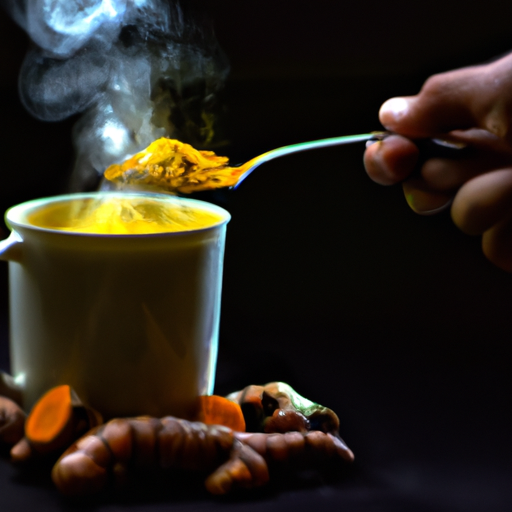
I’ve always been intrigued by the numerous health advantages of turmeric root. This spice, popular in Indian and Asian cooking, has been proven to possess anti-inflammatory and antioxidant qualities. Furthermore, it is thought to aid in lowering the likelihood of chronic illnesses like heart disease, diabetes, and cancer.
One of the easiest ways to incorporate turmeric into your diet is by making turmeric tea. In this article, I will share with you how to use turmeric root to make a delicious and healthy tea.
Before we dive into the process of making turmeric tea, let’s talk about the benefits of using fresh turmeric root. While you can certainly use ground turmeric, using fresh turmeric root will give you a more potent and flavorful tea. Fresh turmeric root has a bright orange-yellow color and a pungent, slightly bitter taste. It also contains higher levels of the active compounds curcuminoids, which are responsible for many of the health benefits associated with turmeric.
So, if you want to get the most out of your turmeric tea, I highly recommend using fresh turmeric root.
Key Takeaways
- Turmeric root has anti-inflammatory and antioxidant properties that can reduce the risk of chronic diseases.
- Turmeric tea is an easy and delicious way to incorporate turmeric into your diet.
- Fresh turmeric root is more potent and flavorful than ground turmeric, and can be complemented by ginger, cinnamon, and honey in tea blends.
- Turmeric tea has numerous health benefits, including reducing inflammation, boosting immunity, improving digestion, and preventing certain types of cancer.
Gather Your Ingredients
Now that I’ve decided to make turmeric root tea, the first step is to gather my ingredients. Of course, the main ingredient is turmeric root. Turmeric is known for its numerous health benefits, including anti-inflammatory and antioxidant properties. It’s also a great ingredient for adding flavor and color to tea.
Aside from turmeric, I’ll also need to decide on different tea blends to complement the turmeric root. Some popular options include ginger, cinnamon, and honey. Each of these ingredients has its own set of health benefits and can also add a delicious flavor to the tea.
Once I have all my ingredients, it’s time to prepare the turmeric root.
Prepare the Turmeric Root
First, grab a fresh turmeric root and give it a good wash under running water. This step is crucial to remove any dirt or debris that may be present on the root. Once washed, use a peeler to remove the skin from the root. Be careful not to remove too much of the flesh, as this is where all the beneficial compounds are located.
Turmeric root has numerous health benefits, including its anti-inflammatory and antioxidant properties. It’s a great addition to any tea recipe and can be used in a variety of ways. You can add it to a ginger and turmeric tea recipe for a spicy kick, or mix it with honey and lemon for a soothing and comforting cup.
With the turmeric root prepared, we can now move on to brewing the tea.
Brew the Tea
To start brewing, simply place the peeled and sliced turmeric into a pot with water and bring it to a boil. It’s important to keep an eye on the pot to prevent it from boiling over. Once the water is boiling, reduce the heat and let it simmer for about 10 minutes.
During the simmering process, the turmeric will release its natural compounds, including curcumin, which is known for its anti-inflammatory and antioxidant properties. By simmering the turmeric, you’ll be able to extract more of these beneficial compounds.
After simmering, strain the tea and enjoy as is or add your favorite sweetener. In the next section, we’ll discuss how to strain and sweeten the tea to your liking.
Strain and Sweeten
Once the turmeric has released all its goodness, it’s time to strain the tea and add a touch of honey or your favorite sweetener to make it a soothing and delicious treat for your taste buds.
To strain the turmeric tea, use a fine mesh strainer or cheesecloth to remove any remaining bits of turmeric or other herbs. This will ensure a smooth and enjoyable tea without any unwanted particles or grittiness in your cup.
When it comes to sweetening your turmeric tea, there are many options to choose from. Honey is a popular choice due to its natural health benefits, but you can also use maple syrup, agave nectar, or even stevia for a low-calorie alternative.
Be sure to taste the tea before adding sweetener, as some people may prefer the natural bitterness of turmeric. Adding a slice of lemon or a sprinkle of cinnamon can also enhance the flavor of the tea.
With these tips for straining and sweetening your turmeric tea, you can enjoy a warm and comforting beverage that is both delicious and beneficial for your health.
Now that your turmeric tea is strained and sweetened to your liking, it’s time to sit back and enjoy the benefits of this amazing spice. Whether you’re sipping the tea to boost your immune system or simply to relax after a long day, turmeric tea is a great addition to any wellness routine.
So go ahead and take a sip, your body will thank you for it.
Enjoy Your Turmeric Tea
Sit back, relax, and savor the delicious and soothing taste of your newly sweetened turmeric brew. Drinking turmeric tea is not only a delightful experience, but it also offers a myriad of health benefits. Turmeric contains curcumin, a compound known for its anti-inflammatory and antioxidant properties. Consuming turmeric tea regularly can help reduce inflammation, boost immunity, improve digestion, and even prevent certain types of cancer.
There are various ways to prepare turmeric tea, and you can experiment with different variations to find the one that suits your taste buds. Some people prefer adding ginger, cinnamon, or honey to their turmeric tea for an extra flavor and health boost. Others mix turmeric with other herbs like chamomile, peppermint, or lavender to create a calming and relaxing blend. Whatever your preference may be, incorporating turmeric tea into your daily routine can be a simple and effective way to improve your overall health and well-being.
| Turmeric Tea Variations | Ingredients | Benefits |
|---|---|---|
| Golden Milk | Turmeric, coconut milk, cinnamon, ginger, honey | Anti-inflammatory, digestive aid, immunity booster |
| Turmeric Ginger Tea | Turmeric, ginger, lemon, honey | Anti-inflammatory, digestive aid, antioxidant |
| Turmeric Chai | Turmeric, black tea, ginger, cinnamon, cardamom, cloves, nutmeg | Anti-inflammatory, energy booster, digestive aid |
Try these different variations of turmeric tea and see which one works best for you. Remember to use high-quality turmeric root and other fresh ingredients to ensure maximum health benefits. With just a few simple steps, you can transform a regular cup of tea into a powerful and delicious elixir that nourishes your body and soul.
Frequently Asked Questions
What are the health benefits of turmeric root tea?
I love drinking turmeric tea because of its numerous health benefits. Research has shown that it can help reduce inflammation, improve brain function, and even lower the risk of chronic diseases. However, it’s important to note that excessive consumption can lead to side effects like upset stomach and nausea. When trying out turmeric tea recipes, be sure to start with small amounts and monitor your body’s response.
Can I use ground turmeric instead of fresh turmeric root?
Yes, ground turmeric can be used instead of fresh turmeric root in tea. However, there may be some differences in flavor and potency. Fresh turmeric root is generally considered to have a more intense flavor and potential health benefits.
How long can I store turmeric root for tea?
I’ve found that turmeric root can last up to three weeks in the fridge if stored properly. To preserve freshness, wrap it in a paper towel and place it in a sealed container. This ensures that it stays dry and free from mold.
Can I add other herbs or spices to my turmeric tea?
Yes, you can add other herbs and spices to your turmeric tea to enhance its flavor and health benefits. Some popular options include ginger, cinnamon, honey, and lemon. Experiment with different combinations to find your favorite flavor profile.
Is it safe to consume turmeric root tea if I am pregnant or breastfeeding?
During pregnancy and breastfeeding, it’s important to be cautious of what we consume. While turmeric root tea may have health benefits, it’s best to consult with a healthcare provider regarding safety concerns. Other turmeric tea recipes may promote digestive health.
Conclusion
In conclusion, using turmeric root in tea is a simple and delicious way to incorporate this powerful spice into your daily routine. I highly recommend trying this recipe myself.
The bright yellow color of the turmeric root creates a beautiful and sunny hue in your tea cup when steeped in hot water, much like the rays of the sun on a summer day. Not only is it visually pleasing, but the health benefits of turmeric are undeniable. Its anti-inflammatory and antioxidant properties can help with digestion, joint pain, and even boost your immune system.
So why not give it a try and add some sunshine to your day with a cup of turmeric tea?
African Tea
Can I Drink Turmeric Tea Every Day?
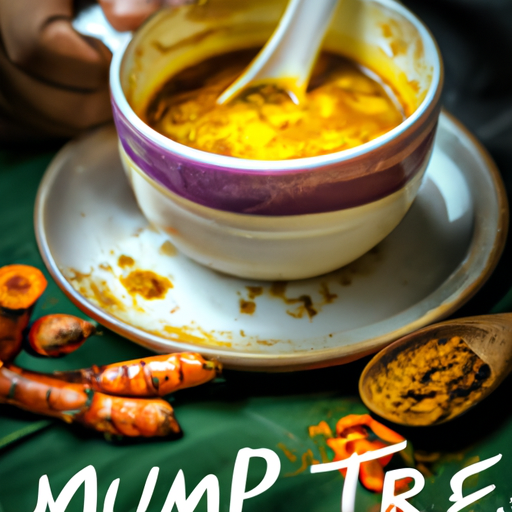
Did you know that turmeric has been utilized for generations in traditional medicine due to its anti-inflammatory and antioxidant qualities? In recent times, turmeric has become a popular superfood and is being added to a variety of dishes and beverages, such as turmeric tea.
According to a survey conducted by the Tea Association of the USA, tea is the second most consumed beverage in the world, with over 80% of households in the United States having tea in their homes. With the growing popularity of turmeric tea, many people are wondering if it is safe to drink it every day.
As someone who enjoys a warm cup of tea every morning, I was curious about the benefits and risks of drinking turmeric tea daily. In this article, we will explore the potential benefits of drinking turmeric tea, such as reducing inflammation and improving brain function, as well as the potential risks, such as gastrointestinal issues and interactions with certain medications.
We will also discuss how to make turmeric tea and how to incorporate it into your daily routine. However, it is important to note that before making any changes to your diet or lifestyle, it is always best to consult with your healthcare provider.
Key Takeaways
- Regular consumption of turmeric tea can reduce inflammation in the body, which is linked to chronic health conditions such as heart disease, cancer, and arthritis.
- While turmeric tea has numerous health benefits, it can interact with certain medications and cause stomach irritation in some individuals, so it’s crucial to speak with a healthcare provider before making it a daily habit.
- Turmeric tea should be consumed in moderation, with a recommended intake of 1-2 teaspoons per day or personalized advice from a healthcare professional.
- Alternative remedies such as ginger or chamomile tea can provide similar health benefits without the risk of stomach irritation, and it’s important to be aware of potential allergic reactions when consuming turmeric tea.
Benefits of Drinking Turmeric Tea
You’ll be amazed at the numerous benefits you’ll reap from drinking turmeric tea daily. This includes reduced inflammation, improved digestion, and boosted immunity. Turmeric is a spice that has been used for centuries in traditional medicine, and recent research has shown that it contains compounds with powerful anti-inflammatory and antioxidant properties.
Drinking turmeric tea regularly can help reduce inflammation in the body, which is linked to a variety of chronic health conditions such as heart disease, cancer, and arthritis. In addition, turmeric tea is also believed to aid in weight loss and improve skin health. Studies have found that turmeric can help regulate metabolism and improve insulin sensitivity, leading to weight loss.
Furthermore, the antioxidant properties of turmeric can help protect the skin from damage caused by free radicals, leading to a healthier and more youthful complexion. However, it’s important to note that while drinking turmeric tea can provide numerous health benefits, there are also some risks associated with consuming it daily.
Risks of Drinking Turmeric Tea Every Day
As someone who drinks turmeric tea regularly, it’s important to be aware of the potential risks associated with consuming it every day.
Turmeric can interact with certain medications, such as blood thinners, and may cause stomach irritation in some individuals.
Additionally, allergic reactions to turmeric are possible and may lead to serious health complications.
It’s crucial to speak with a healthcare provider before making turmeric tea a daily habit, especially if you have any preexisting medical conditions or take medications.
Interaction with Medications
If you take medications regularly, it’s important to talk to your doctor before drinking turmeric tea every day to make sure there are no potential interactions. Turmeric can interact with certain medications such as blood thinners, diabetes medications, and drugs that reduce stomach acid.
The following are some precautions to consider when drinking turmeric tea:
-
Blood thinners: Turmeric can increase the risk of bleeding, so it’s important to talk to your doctor if you’re taking blood thinners like aspirin, warfarin, or clopidogrel.
-
Diabetes medications: Turmeric can lower blood sugar levels, so it’s important to monitor your blood sugar levels if you’re taking diabetes medications like insulin or metformin.
-
Drugs that reduce stomach acid: Turmeric can increase stomach acid production, so it’s important to talk to your doctor if you’re taking medications that reduce stomach acid like proton pump inhibitors or H2 blockers.
It’s important to note that not everyone will experience interactions with their medications and turmeric tea, but it’s always better to err on the side of caution.
In the next section, we’ll discuss the potential for stomach irritation when drinking turmeric tea every day.
Stomach Irritation
Experiencing stomach irritation from consuming too much turmeric can be a painful and uncomfortable experience. While turmeric tea has numerous health benefits, overconsumption can lead to gastrointestinal issues such as nausea, bloating, and diarrhea. It is recommended to limit turmeric intake to 1-2 teaspoons per day or consult with a healthcare professional for personalized advice.
To avoid overconsumption, it is important to be mindful of how much turmeric you are adding to your tea. A 2-column and 3-row table can help to provide a visual aid for understanding appropriate serving sizes and potential side effects. Additionally, alternative remedies such as ginger tea or chamomile tea can provide similar health benefits without the risk of stomach irritation.
Although stomach irritation from turmeric tea is a common concern, it is important to also consider the possibility of allergic reactions.
Allergic Reactions
Allergic reactions to turmeric can cause a range of symptoms, including hives, difficulty breathing, and swelling of the face or throat. Although rare, a turmeric allergy can be severe and even life-threatening, especially in people with a history of allergies or asthma. If you experience any of these symptoms after consuming turmeric tea, seek medical attention immediately.
Managing reactions to turmeric may involve avoiding the spice altogether or opting for low doses. If you’re not sure if you have an allergy, start with small amounts of turmeric and gradually increase the dose. If you develop an allergy, stop using turmeric and speak to your doctor. Alternatively, you can consider other herbs or spices that offer similar health benefits, such as ginger, cinnamon, or cardamom. These can be added to hot water or tea to create a delicious and nutritious drink.
When it comes to making turmeric tea, there are different ways to do it. One popular method is to boil water and add a teaspoon of turmeric powder, along with other ingredients such as ginger, lemon, or honey. Another option is to steep turmeric root in hot water or milk for a few minutes, then strain and drink. Regardless of how you make it, be aware of the potential for allergic reactions and adjust your consumption accordingly.
How to Make Turmeric Tea
I love making turmeric tea at home because it’s a simple and delicious way to enjoy the health benefits of this powerful spice. To make the perfect cup, you’ll need just a few ingredients: turmeric powder, black pepper, honey, and water.
Follow these step-by-step instructions and try out some of my tips for enhancing the flavor to create a delicious and healthy turmeric tea that you can enjoy every day.
Ingredients
You’ll love the spicy aroma of fresh ginger and the warm, earthy flavor of turmeric in your daily cup of turmeric tea. Not only is it delicious, but turmeric tea also offers a range of health benefits.
The main active ingredient in turmeric, curcumin, has anti-inflammatory and antioxidant properties that can help reduce inflammation in the body and protect against chronic diseases.
To make turmeric tea, you’ll need a few simple ingredients, including fresh turmeric root, fresh ginger root, black pepper, and honey or lemon to taste. There are many variations of turmeric tea recipes, but the basic ingredients remain the same.
Once you have your ingredients, you can follow the step-by-step instructions to make a delicious cup of turmeric tea that you can enjoy every day.
Step-by-Step Instructions
First, grab your fresh turmeric and ginger roots, black pepper, honey or lemon, and get ready to create a warm and flavorful cup that’ll leave you feeling nourished and satisfied.
There are several variations of turmeric tea that you can make, depending on your preferences. Some prefer to use milk instead of water, while others like to add cinnamon or cardamom for a more aromatic taste. You can also experiment with different types of sweeteners, such as maple syrup or agave, to find the perfect balance of sweetness.
When it comes to brewing techniques, there are a few things to keep in mind. First, make sure to finely chop or grate the turmeric and ginger roots to release their full flavor. Then, add them to a pot with water and black pepper and let it simmer for about 10-15 minutes. Strain the mixture and add honey or lemon to taste.
Alternatively, you can use a tea infuser or a French press to brew your tea. The key is to let the ingredients steep for at least 5 minutes for maximum flavor.
With these tips, you can create a delicious cup of turmeric tea that’ll warm your soul and invigorate your senses. Next, we’ll discuss some tips for enhancing the flavor even further.
Tips for Enhancing Flavor
To enhance the flavor of your turmeric tea, there are a few simple tips you can try.
First, consider adding a pinch of freshly ground black pepper to your brew. Not only does this add a subtle spice, but it can also increase the bioavailability of curcumin, the active ingredient in turmeric, by up to 2000%.
Another way to enhance the flavor is to experiment with different brewing techniques. You can try steeping the tea for a longer or shorter amount of time, or even adding other spices like cinnamon or ginger to create a unique flavor profile.
Incorporating turmeric tea into your daily routine is a great way to reap the many health benefits of this powerful spice. Whether you enjoy it hot or cold, with honey or lemon, there are endless ways to make turmeric tea a part of your daily ritual.
So why not give it a try and see how it can help support your overall health and wellness?
Incorporating Turmeric Tea into Your Daily Routine
Mornings can be a hectic rush, but adding a cup of turmeric tea to your daily routine can help you start your day on a healthy note. Turmeric tea benefits are numerous, from reducing inflammation to aiding digestion and improving brain function. To fully reap these benefits, it’s important to brew the tea correctly and incorporate it into your daily routine in a way that works for you.
Here are some brewing tips and ideas for incorporating turmeric tea into your daily routine:
| Brewing Tips | Adding Turmeric to Daily Routine | Health Impact |
|---|---|---|
| Use fresh turmeric root or high-quality turmeric powder | Drink it in the morning to kickstart your day | Reduces inflammation |
| Add a pinch of black pepper to increase absorption | Enjoy it as an afternoon pick-me-up | Aids digestion |
| Steep for 10-15 minutes to release the full flavor and benefits | Mix it into your smoothie or oatmeal | Improves brain function |
Remember, while turmeric tea can have numerous health benefits, it’s important to consult with your healthcare provider before making any significant changes to your diet or health routine.
Consult with Your Healthcare Provider
Just like how a ship needs a captain to navigate through rough waters, consulting with your healthcare provider before making any significant changes to your diet or health routine is a crucial step towards a healthier lifestyle.
While turmeric tea has been known for its numerous health benefits, it’s still important to seek advice from your healthcare provider to ensure that it’s safe for you to drink it every day.
Your healthcare provider can help assess your overall health condition and provide dosage recommendations to make sure that you’re taking the right amount of turmeric tea. This is particularly important if you’re taking any medications or have any existing health conditions, as turmeric tea can interact with certain medications and exacerbate certain health conditions.
By consulting with your healthcare provider, you can ensure that you’re consuming turmeric tea in a safe and effective manner, and reap its many health benefits without any adverse effects.
Frequently Asked Questions
Can turmeric tea be consumed while pregnant or breastfeeding?
As a pregnant or breastfeeding individual, it is important to consider the safety of consuming turmeric tea. While it has potential health benefits, it is recommended to consult with your healthcare provider regarding nutrition during pregnancy and lactation. There may be safety concerns and potential risks to consider.
Is it safe to consume turmeric tea if you have a bleeding disorder?
As someone with a bleeding disorder, I take safety precautions when consuming turmeric tea. While it may have health benefits, it’s important to consult with a healthcare provider and consider alternative remedies to avoid potential complications.
Can turmeric tea interact with certain medications?
It’s important to note that turmeric tea can interact with certain medications, including blood thinners and diabetes medication. Consult with a healthcare provider before consuming regularly. Regular consumption may also improve liver function.
Can turmeric tea be consumed on an empty stomach?
Drinking turmeric tea on an empty stomach can aid digestion and reduce inflammation. The best time to consume it is in the morning. It’s important to note any potential interactions with medications.
How much turmeric tea should be consumed daily for optimal health benefits?
For optimal health benefits, a daily turmeric tea dosage of 1-2 teaspoons of turmeric powder is recommended. Regular consumption can provide anti-inflammatory and antioxidant effects, improved brain function, and reduced risk of chronic diseases.
Conclusion
Overall, drinking turmeric tea every day can have numerous benefits for our health and well-being. From reducing inflammation to improving cognitive function and supporting digestion, turmeric has been shown to be a powerful natural remedy. However, it’s important to keep in mind that consuming too much turmeric can have its risks as well.
While it’s generally safe to drink turmeric tea in moderation, consulting with a healthcare provider is always recommended, especially if you have any underlying medical conditions or are taking medications. As with any herbal remedy, it’s important to be mindful of any potential side effects and to listen to your body’s individual needs.
Incorporating turmeric tea into your daily routine can be a simple and effective way to support your overall health and well-being.
African Tea
Can I Drink Ginger And Turmeric Tea While Breastfeeding?

As a new mom, I am constantly seeking ways to enhance my health and well-being while still ensuring that my baby receives the highest quality nutrition.
That’s why I was curious about the benefits of drinking ginger and turmeric tea while breastfeeding.
Not only do these two herbs have a reputation for boosting immunity and reducing inflammation, but they are also believed to help with digestion and alleviate nausea – two common concerns for new moms.
While I was eager to reap the potential benefits of ginger and turmeric tea, I also wanted to make sure it was safe for me and my baby.
After doing some research, I discovered that there are certain precautions to keep in mind when consuming herbal teas while breastfeeding.
In this article, I will share what I learned about drinking ginger and turmeric tea while breastfeeding and provide tips for preparation and consumption.
Key Takeaways
- Ginger and turmeric tea can be beneficial for breastfeeding mothers as it can boost immunity and increase milk production.
- However, excessive intake of herbal teas can lead to potential side effects such as gastrointestinal upset, bleeding risk, and bruising risk.
- Herbal remedies should be consumed safely with the guidance of a healthcare provider to ensure safety and appropriateness of herbal remedies and to address potential drug interactions.
- Breastfeeding provides optimal nutrition for infants and promotes bonding between mother and baby while also reducing the risk of certain diseases for both mother and baby.
Benefits of Ginger and Turmeric Tea for Breastfeeding Mothers
You’ll love how drinking ginger and turmeric tea can benefit you as a breastfeeding mother! Not only does this tea taste great, but it can also provide immune support and increase milk production. As a new mom, my immune system can use all the help it can get, especially since I want to avoid getting sick while taking care of my baby.
Ginger and turmeric have natural anti-inflammatory and antioxidant properties that can help boost my immune system. This means that I’m less likely to get sick and can keep my energy levels up to take care of my little one.
In addition to immune support, drinking ginger and turmeric tea can also help increase milk production. As a breastfeeding mother, I’m always looking for ways to increase my milk supply and ensure that my baby is getting enough to eat. Ginger and turmeric have been used for centuries in traditional medicine to help with digestion and stimulate milk production.
By drinking this tea regularly, I can help my body produce more milk and ensure that my baby is getting all the nutrients they need. Now, let’s move on to how much ginger and turmeric tea you can safely consume while breastfeeding.
How Much Ginger and Turmeric Tea Can You Safely Consume While Breastfeeding?
As a breastfeeding mother, I want to ensure that I’m consuming the right amount of ginger and turmeric tea to reap the benefits without any potential harm. It’s recommended to consume no more than 1-2 cups of ginger and turmeric tea per day while breastfeeding. However, it’s important to consult with a healthcare provider to ensure that there are no potential side effects for you or your baby.
Recommended Daily Intake
The recommended daily intake of ginger and turmeric tea for breastfeeding mothers is two to three cups per day. This recommendation is based on the nutritional content of these herbs and their potential benefits for lactating mothers. Ginger and turmeric contain anti-inflammatory and antioxidant properties that may help with postpartum recovery and boost the immune system.
Below is a table outlining the nutritional content of ginger and turmeric in one teaspoon of powdered form:
| Nutrient | Ginger | Turmeric |
|---|---|---|
| Calories | 6 | 9 |
| Carbohydrates (g) | 1.3 | 1.8 |
| Fiber (g) | 0.1 | 0.2 |
| Protein (g) | 0.1 | 0.2 |
| Fat (g) | 0.1 | 0.2 |
| Iron (mg) | 0.1 | 0.5 |
| Calcium (mg) | 1 | 3 |
| Potassium (mg) | 28 | 114 |
It is important to note that while ginger and turmeric tea can be beneficial for breastfeeding mothers, excessive intake can lead to potential side effects. Let’s take a closer look at these potential side effects in the next section.
Potential Side Effects
But what about potential side effects of consuming ginger and turmeric tea while breastfeeding? While these herbs are generally considered safe, there are some concerns about their long-term effects and interactions with medication.
For example, ginger may interact with blood thinners and may increase the risk of bleeding. Turmeric may also interact with blood thinners and may increase the risk of bleeding or bruising. In addition, consuming large amounts of ginger or turmeric may cause gastrointestinal upset, such as nausea, vomiting, or diarrhea.
It’s important to note that these side effects are usually mild and temporary, but if you experience any adverse reactions, it’s important to consult with a healthcare provider. It’s always a good idea to talk to your healthcare provider before consuming any herbal remedies, especially if you have any underlying health conditions or are taking any medications.
Consultation with a Healthcare Provider
Before consuming any herbal remedies, it’s always wise to consult with a healthcare provider, especially if you have any underlying health conditions or are taking any medications. This is particularly important for breastfeeding mothers as the health and well-being of both the mother and infant are at stake. While ginger and turmeric tea may have many potential benefits, it’s important to ensure that it’s safe and appropriate for your individual circumstances and that it won’t negatively impact breastfeeding.
To help guide your conversation with your healthcare provider, the following table outlines some of the potential benefits of breastfeeding and the importance of seeking their guidance before consuming ginger and turmeric tea. Keep in mind that this is not an exhaustive list, and your healthcare provider may have additional recommendations or concerns based on your medical history and current situation. Ultimately, their guidance can help ensure that you and your baby stay healthy and well-nourished while breastfeeding.
| Benefit of Breastfeeding | Importance of Healthcare Provider Guidance |
|---|---|
| Provides optimal nutrition for infants | Ensures safety and appropriateness of herbal remedies |
| Promotes bonding between mother and baby | Addresses potential drug interactions |
| Boosts infant immune system | Considers individual health history and current circumstances |
| Reduces risk of postpartum depression in mothers | Monitors for any side effects or adverse reactions |
| May reduce risk of certain diseases for both mother and baby | Maintains overall health and well-being of mother and baby |
With the guidance of your healthcare provider, you can make an informed decision about whether ginger and turmeric tea is right for you while breastfeeding. It’s important to follow their recommendations and ensure that any herbal remedies you consume are prepared and consumed safely.
Preparation of Ginger and Turmeric Tea
To make ginger and turmeric tea, you’ll need to grate a small piece of ginger and a small piece of turmeric root, then boil them in water for 10-15 minutes. This tea is not only delicious but also packed with health benefits.
Ginger is known to help with nausea, digestion, and inflammation while turmeric has anti-inflammatory properties that can help with joint pain and other inflammatory conditions.
To prepare the tea, start by grating a small piece of ginger and a small piece of turmeric root. Place them in a pot with water and bring to a boil. Let it simmer for 10-15 minutes until the water turns golden and fragrant. Strain the tea and enjoy.
Other variations of the recipe include adding honey or lemon for added flavor.
If ginger and turmeric tea is not your cup of tea, there are other herbal teas to consider that are safe to drink while breastfeeding. Let’s explore some of these options in the next section.
Other Herbal Teas to Consider
Now that we’ve discussed how to prepare ginger and turmeric tea, let’s explore other herbal tea options for breastfeeding mothers. While ginger and turmeric tea are safe for most people, it’s always good to have a variety of options to choose from. Additionally, some herbs may have properties that are beneficial for lactation and postpartum recovery.
Here are three herbal teas that are safe to drink while breastfeeding:
-
Fennel tea – Fennel is known to be a galactagogue, which means it can help increase milk supply. It’s also been used traditionally to relieve digestive issues and colic in babies.
-
Chamomile tea – Chamomile is a calming herb that can help reduce stress and anxiety. It’s also been found to have anti-inflammatory properties and may be helpful for healing after birth.
-
Nettle tea – Nettle is a nutrient-rich herb that can help boost energy levels and support postpartum healing. It’s also been found to increase milk supply and may be helpful for preventing postpartum hemorrhage.
As with any herbal supplement, it’s important to take safety precautions when drinking herbal teas while breastfeeding. Always consult with your healthcare provider before adding any new herbs to your diet, especially if you have a history of allergies or other medical conditions.
Additionally, be sure to purchase herbal teas from a reputable source and avoid any that contain herbs that are known to be unsafe for breastfeeding mothers.
Frequently Asked Questions
Are there any side effects of drinking ginger and turmeric tea while breastfeeding?
As a breastfeeding mother, I have researched the benefits and precautions of drinking ginger and turmeric tea. While there are no known side effects, it’s important to consult with a healthcare provider before consuming any herbal teas.
Can ginger and turmeric tea increase breast milk supply?
Boosting breast milk supply is important for breastfeeding benefits. Herbal tea alternatives like ginger and turmeric can increase milk production, similar to how rain nourishes a garden. However, consult with a healthcare professional before consuming.
Can ginger and turmeric tea be harmful to the baby?
Breastfeeding safety of ginger and turmeric tea is uncertain. While these herbs have potential health benefits, they may also pose risks to infants. Consult a healthcare provider before consuming during lactation.
Can I add honey or other sweeteners to ginger and turmeric tea while breastfeeding?
As a breastfeeding mother, I’ve found alternatives to honey, such as stevia or maple syrup, to sweeten ginger and turmeric tea. Best brewing methods include simmering for 10-15 minutes to extract the most benefits.
Can I drink ginger and turmeric tea while taking medication for postpartum depression?
Before consuming ginger and turmeric tea while taking medication for postpartum depression, it is important to consult with a healthcare provider regarding potential medication interactions and recommended dosages.
Conclusion
In conclusion, as a breastfeeding mother, I’ve found that drinking ginger and turmeric tea has been a great addition to my daily routine. Not only do these herbs have numerous health benefits, but they also add a delicious and comforting flavor to my tea.
I’ve found that drinking one to two cups of ginger and turmeric tea per day has not caused any negative side effects for me or my baby. However, it’s important to note that every body is unique and may react differently to certain herbs.
It’s always best to consult with a healthcare professional before adding any new supplements or herbs to your diet while breastfeeding. Overall, I highly recommend trying ginger and turmeric tea as a natural and healthy way to support breastfeeding and overall wellness.
And who knows, you may just find a new favorite beverage that you can enjoy even after your breastfeeding journey is over!
-

 Turmeric Tea4 weeks ago
Turmeric Tea4 weeks agoWhat Teas Are Low In Oxalates
-
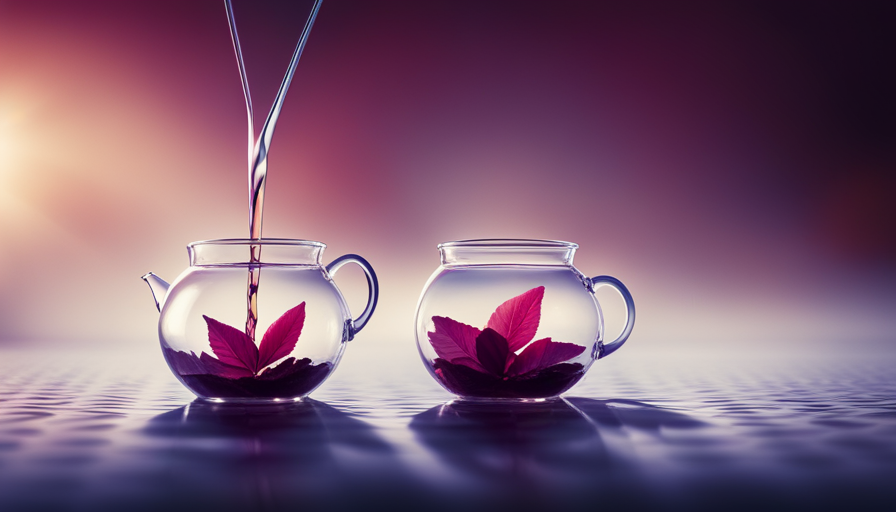
 Turmeric Tea4 weeks ago
Turmeric Tea4 weeks agoWhat Teas Have No Tannins
-

 Turmeric Tea3 months ago
Turmeric Tea3 months agoHow To Make Turmeric Tea With Powder
-
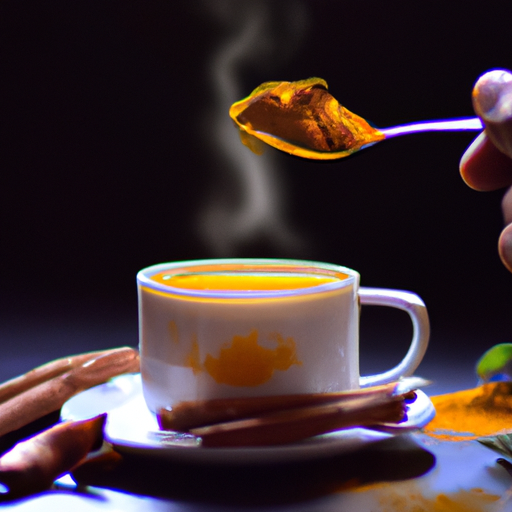
 Turmeric Tea2 months ago
Turmeric Tea2 months agoHow To Put Turmeric In Tea
-
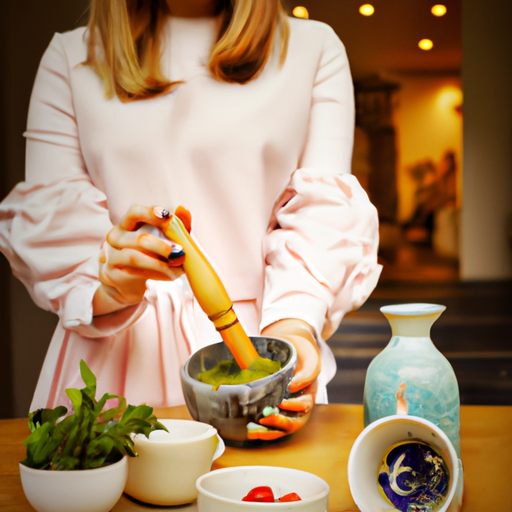
 Matcha Tea3 months ago
Matcha Tea3 months agoHow To Make Matcha Powder From Green Tea
-
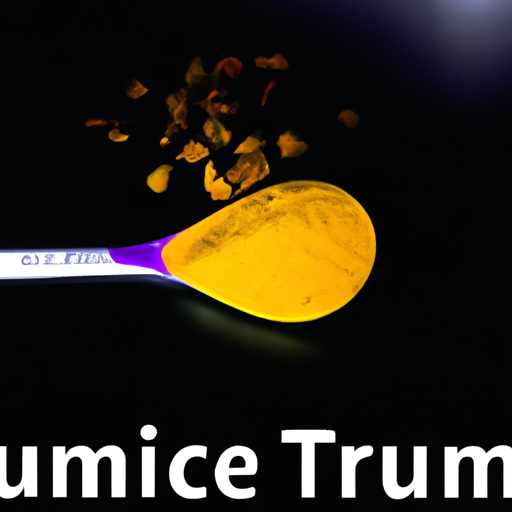
 Turmeric Tea2 months ago
Turmeric Tea2 months agoHow Much Is 500 Mg Of Turmeric In Teaspoons?
-

 Turmeric Tea3 months ago
Turmeric Tea3 months agoBrewing the Perfect Cup of Turmeric Tea
-
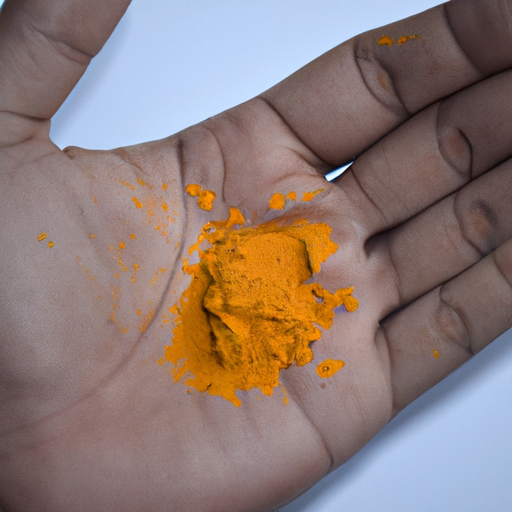
 Turmeric Tea2 months ago
Turmeric Tea2 months agoHow To Use Turmeric To Stop Periods
